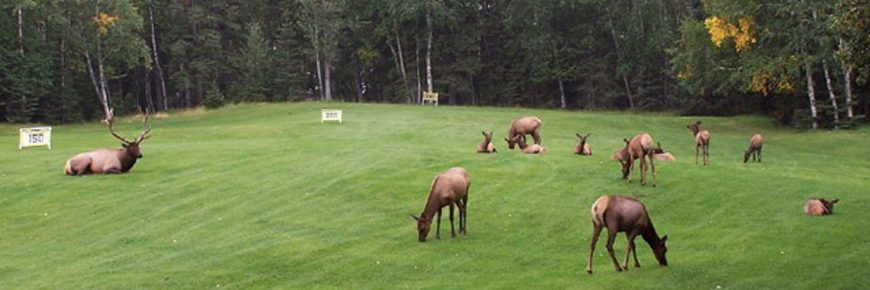
Wildlife Safety
Prince Albert National Park
Prince Albert National Park is home to wildlife such as bison, black bears, elk, moose, white-tailed deer, wolves, foxes and even cougar. Seeing these animals while hiking and camping can be the highlight of any visit. As animal behaviour is not always predictable, there may be risks associated with being in close proximity to any wild animal. To ensure your experience is a safe one, please follow these tips:
Camping
A clean campsite, free of animal attractants is the best way to prevent wildlife conflicts in campgrounds.
An animal attractant is any item that has an odour or may be visually associated with food. Food items, personal hygiene products, dirty dishes, pet food, garbage, even an empty cooler are all examples of an animal attractant. When not being used, these items must be stored in a secure location such as your RV, vehicle or designated storage facility provided by Parks Canada. Leaving these items unattended in your campsite, even for only a few minutes, puts yourself and other campers at risk.
Remember, cooking in or near your tent is dangerous and can leave odours that may attract wildlife!
Wildlife Watching
Seeing wildlife in their natural environment is a vacation highlight for most visitors. For your safety, the safety of others and the safety of wildlife, please stay a respectful distance away from any wild animal. It is dangerous to approach a wild animal. When possible allow a minimum of 30m distance from elk and other ungulates and 100m from predators such as black bears, wolves and cougars. Consider that even small animals such as ground squirrels can give a serious bite.
In the spring, females of all species will defend their young if they feel threatened. Beginning in late summer and lasting throughout the fall is the rut (breeding season) for elk, deer, moose and bison. Male animals are more aggressive during this time.
When driving please observe posted speed limits and watch for wildlife on or near the roadway. When watching wildlife from your vehicle, remain in your vehicle, pull over onto the shoulder and engage your hazard lights. For your safety and the safety of wildlife, it is unlawful to feed or attempt to lure a wild animal with food.
Pet owners should take extra care. For the safety of you and your pet, pets must be kept on leash at all times. Unleashed pets can provoke a defensive response in many species of wildlife, potentially harming your pet, wildlife, and even you. Smaller animals such as porcupines and skunks also pose a threat to pets.
Hiking
Prince Albert National Park offers an abundance of different hiking experiences, from short boardwalk strolls to long backcountry treks. In the backcountry you might travel for hours without encountering another visitor.
Wildlife can be found anywhere within the park. While hiking it is safe practice to make some noise so that animals are aware of your presence. Hiking with a friend or in a group will also help alert animals to your presence. A surprised animal might react aggressively to defend itself.
Pet owners should take extra care when hiking. For the safety of you and your pet, domestic animals must be under physical control at all times. Unleashed pets can provoke a defensive response in many species of wildlife.
For more information on wildlife safety, please speak with a Parks Canada staff member, or visit AdventureSmart.
- Date modified :